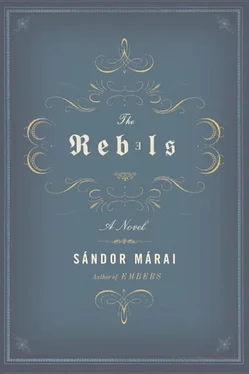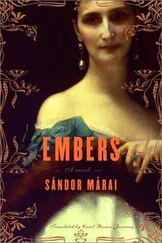It was this spring that they lost all sense of proportion. It was not exactly that their games had turned more solemn. Lajos would go off by himself on long walks while they kept a wary eye on him. In certain respects they regarded Lajos as an adult. He was free to do what he wanted and, just as he excused himself from adult ranks as and when he chose, so he might, at any moment, choose to rejoin the enemy. He started wearing his army uniform again and spent the day hanging around with the actor. It seemed he had grown bored of meetings at The Peculiar. He was back in the café. The gang even discussed barring him but then the one-armed one turned up and just at the beginning of the season introduced the gang to the actor.
The introductions took place in Tibor’s room. The actor immediately won their confidence when, out of sheer good manners, he climbed in through the window.
Tibor was the center of the group. Everything revolved around him: they had come together to please him. It was to him they brought their sacrifices and offerings. When the gang abandoned the “for its own sake” principle, there slowly developed a kind of material competition for Tibor’s favors. Ábel wrote poems addressed to him. Béla would bring him presents. Ernõ carried his books, polished his shoes, and undertook all kinds of servant-and-porter tasks for him. Tibor, who had always been courteous, remained remarkably generous and courteous as the object of all this warmth and furious competition.
The younger son of Colonel Prockauer, apart from a passing phase of acne, was, for the gang, that mysterious being, the epitome of all physical perfection. The reputation of Prockauer Junior was much the same in town: so beautiful, so charming. Despite the various boyish accomplishments of running, swimming, riding, leaping, and excelling at tennis Tibor presented a somewhat soft, almost effeminate appearance. His very pale skin and the curiously wavy blond hair that kept falling over his brow covering his blue-gray eyes confirmed the impression. He had inherited his father’s raw fleshy lips as well as the strong oval hands with their short fingers. But the lines of his nose and brow were delicate and mild and the fascinating discrepancy between the upper and lower regions of his face made for a certain uneasiness. His face lacked the normal adolescent’s state of grotesque half-preparedness. It was as if the development of what was boyish in him had been suspended at a particularly fortunate moment in childhood, as if the sculptor had got so far, taken his hand away, and declared with satisfaction: let it remain as it is. Even at thirty Tibor would still look like a boy.
In every movement, in each appearance, whenever he laughed or spoke to somebody, whenever he thanked another with a smile, a characteristic rhythm or pace made itself felt, a light and almost shy courtesy. Unlike Béla and Ernõ, or his contemporaries generally, he seemed to utter foul language with a kind of reluctance, as if he had first to overcome some better part of himself. His profanities appeared to be a form of good manners, an aspect of his courtesy to the others whom he did not wish to shame by remaining silent while they swore.
He did not say much. Something about his being, the way he looked, suggested astonishment. Whenever Ábel or Ernõ were speaking he had the knack of moving in close and with wide-open eyes paying them the utmost attention, then asking the simplest and most admiring of questions, always acknowledging the answer with a graceful smile. It was hard to tell whether the consideration that he radiated had been intensely cultivated or was the result of an entirely unselfconscious curiosity. Books frightened him whenever Ábel wanted to share his own enthusiasm for what he happened to be reading, and it was always with the utmost nervousness that he took a book in his hands, as if it were a highly complex, slightly mysterious object not altogether pleasant to the touch and he would only touch it in order to please his friend.
He lived with them, among them, and took no sides. He exhibited the patience of a good-hearted, high-born gentleman of leisure moving among impatient but decent courtiers, with the foggy sense that his place in relation to theirs was permanently fixed by his birth and destiny. He had a vague feeling that the gang was some inevitable part of that destiny, and as with all matters of fate the fact seemed to him both painful and ridiculous. These boys, from whom he was separated for only a few hours at a time when they were sleeping, to whom he felt bound by a power whose meaning and purpose lay beyond him, that was stronger than any other human bond, were not even particularly sympathetic to him. He wasn’t really attracted to their form of rebellion: they seemed to have chosen it by some act of incomprehensible, intangible aggression. The environment in which they lived, the disorderly order, the unknown, unbearable, disintegrating world outside had also brought him close to a state of internal rebellion, but it was a simpler, more tangible, more violent form of revolution that appealed to him. He felt fully part of everything they did: he couldn’t resist the tantalizing spell it cast with its peculiar means of protest and negation and the way it permeated all their games, a spell whose power emanated from Ábel or possibly Ernõ. His tastes though ran to less complex forms of resistance. For instance, Tibor would never have argued against a scheme whereby they set up a machine gun in front of the church and fought a battle of self-defense, and if one of them were to suggest that they should set fire to the town one windy night it would only have been the practical details that gave him food for thought.
The boys—this gang—in whose midst he suddenly happened to find himself, who seemed to have materialized around him, were not entirely what he would have chosen. He never dared confess this to anyone. He was ready to sacrifice his life to the gang because the gang would have sacrificed theirs for him. The military ethos of his father had somehow percolated through to him and exerted a certain influence. All for one and one for all. That “one” was Tibor.
He observed other groups, other gangs, with a kind of embarrassed longing, admiring the pranks of his schoolmates who, despite the yoke the world imposed on them, seemed to bear their lot lightly with wild practical jokes, fiercely competitive sports, and, above all, by giving themselves to the cult of the body. Tibor admired nothing so much as physical courage. The gang, however, violently rejected such acts of physical bravado along with all other forms of bravado that had any practical application as an entirely alien mode of being.
He couldn’t understand why he was with them. He couldn’t—he didn’t wish to—dissociate himself from them but he continued to feel that he was a guest in whose honor they had gathered together. Everything they did filled him with a sour and vengeful delight. What is to become of all this, he thought and curled his lip. But he was incapable of disengagement. He sensed that there was a latent meaning in their games, that behind the games there glimmered a world he too remembered, a fresh, just, inexpressibly exciting world out of whose splinters the gang wanted to construct something, a small bell jar under a vast sky, within which they might hide themselves and stare at the world outside through the glass, their faces bitterly contorted.
He was the only one among them who didn’t care whether the jar cracked or not, whether he would be drafted. Fear of the war? Could it be worse than the funk before exams, the humiliating concealments, the servile subterranean life they were condemned to live as things stood? War, in all likelihood, was just another form of servitude and humiliation invented by adults to torture one another and people weaker than themselves.
Читать дальше












